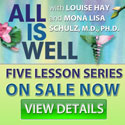Before my son was born, I imagined all of the wonderful foods to which I would introduce him. First, I imagined him
drinking from my breast and getting all of his initial nourishment from my body. Then I imagined his first spoonful of solid
food and his reaction to it. I even imagined teaching him about how to use a fork and spoon. However, not once in my
imaginings did I picture him teaching me about food and eating—but he has, and in doing so, has taught me about life and
how to live.
A little less than a year after my son was born, I went to the Institute for Integrative Nutrition in New York City to learn about nutrition, dietary theory, how to feed my son a healthy diet and how to teach him lifelong healthy eating habits. During my studies, I also learned about pesticides, genetically modified foods, dangerous food additives, labeling laws that side with the food manufacturers, the perils of processed foods, mercury and PCBs in farmed fished, factory farming and on and on. For the first time in my life, I was truly frightened by the current state of our food. I was also really confused as to what I should feed my son to protect him for all of the aforementioned dangers and how to give him the nutrients required for his growing body.
I begin to eat rigidly, avoiding all processed foods, all fish that wasn’t wild Alaskan, all beef that wasn’t grass-fed, all chicken that wasn’t free range and antibiotic free. I obsessed about food and how to protect my family from its many insidious dangers. I no longer enjoyed food because I was afraid of it. I no longer savored the smells from the kitchen because I would think about unlabeled additives that might be in it causing the food to smell that way or the coloring added to the meat to make it look the way it does. How could I teach my son to love all aspects of eating—food shopping, preparing, cooking and then sharing an amazing meal with family and friends—when I couldn’t do that myself?
Little by little, he taught me how to teach him. By paying attention to how he explores the world, I was able to recognize the things he needs from me to make good choices and feel safe about those choices. Here are some of the things I learned from my son:
Forget the scary, food should be fun
It's fun to smell food, to let it run down your chin, to throw it at the dog. It's fun to experiment with different tastes, textures, smells and combinations. It's fun to put a blanket on the floor and have a picnic. It's fun to throw caution to the wind with recipes and see what happens. How do you have fun with your food?
Exploring your food adds to your enjoyment of it
My son loves to put things in his mouth, especially food. He loves to experience what things taste like and how things feel on his tongue. He explores the shape of things, the texture of it, the soft or hardness of it. He looks at it and plays with it. My son reminds me that food can be a joy for all the senses.
He also loves to expand his abilities and create new things. He helps me in the kitchen by stirring the meal, adding in vegetables and spices and even by naming a new dish. And he is much more willing to eat something he has helped prepare.
Be consistent
Most of us know that our children thrive on routine and that applies to eating as well. I have found that that my son feels most safe and free to try new foods when I stick with the routine of cooking with him close by, allowing him to help with food preparation and then eating with him at the dining room table, rather than in front of the TV or in the car. When his routine is consistent, he is able to explore his boundaries, learn what behavior is permitted and what is not and feel comfortable asking questions and trying new things.
Be a good role model
At this stage of my son’s young life, my husband and I are his primary role models. It is important that we live up to that responsibility. Rather than disparage the state of food in this country, I need to talk about all of the amazing options we have for food in our area, including community farms, breeders of organic meat and food cooperatives. I need to show him how food is grown and let him grow his own food in our garden. I need to use positive words when I talk about food and all that it encompasses. I need to be able to put aside my food fears and show him that food can be nourishing and fun.
Lighten Up
If I continue to feel negative about food, my actions and thoughts may teach my son to be scared of food, to abuse it or to use it for more than the nutrients and calories it provides. I need to trust that the experiences my son has with food will teach him to enjoy it and to explore it without fear or baggage. I need to be his guide, to teach him what I know, and to allow him to choose the direction he takes. No matter what his age, it is important that I provide him with respect for his decisions and his intelligence rather than force my opinions on him (outside of sticking that fork in the outlet, that is).
Have Patience and Fortitude
My son’s attitude about food and his willingness to experiment with it is variable depending on his mood. I have learned that it is important frequently present those good-for-him foods that he refuses to eat, since he will actually eat them every now and again. Yes, I get frustrated when my son throws his food or spits it out or smacks it away, but that’s where patience comes into play. As parents, we need to be willing to keep trying and not assume the worst (he’s not going to eat it no matter what). I only give up after 10 exposures, which is the time is takes for the palate to change. If he still refuses it then, I can feel more confident that he really does not like it and that it is not just his willfulness.
No matter what, though, I do not reward my son’s food behavior with more food, like dessert. If a child learns that he can only get dessert after he eats his veggies, then he will know that dessert is a treat and veggies are not and that can be counterproductive to his eating healthy. Heck, why not make vegetables dessert?
Be Prepared
My son cannot choose to eat well unless I have healthy choices on hand when he gets hungry. Toddlers have smaller stomachs than adults and need to eat less at each sitting, but more frequently than adults. Because of that, I always carry healthy snacks with me wherever we go. My son loves raisins and dried cherries, trans fat free wheat crackers, chopped carrots and peppers, mixed fresh fruit (apples, oranges, applesauce cups), veggie chips and, of course, sippy cups filled with filtered water to keep him hydrated.
I also make sure that I have healthy food on hand at home that it is easily and quickly prepared once we arrive home from our day. I like to cook with my slow cooker, so a fresh meal is prepared every day and the time preparing the food is easily accomplished in the morning. I also like to cook a big batch of the staples I use all week in my cooking, such as quinoa and chicken, as well as cut and wash all the vegetables at once, so the preparation of the foods that do not go in the slow cooker is done ahead of time. That stops my son’s hunger tantrums and allows us time to have a nice meal as a family before his bedtime.
Most of all, my son has taught me to trust my instincts. Deep down, each one of us knows that we are good parents. Why would you be reading this article if you weren’t? We love our children and instintively we know what is good and bad for them. Just as they know the same about themselves, though we need to guide them to that knowing. We know what foods will nourish us and them and commit ourselves to learning everything we can in order to make this world a place that is satisfying, sane and healthy for our children.
Subscribe to:
Post Comments (Atom)





No comments:
Post a Comment